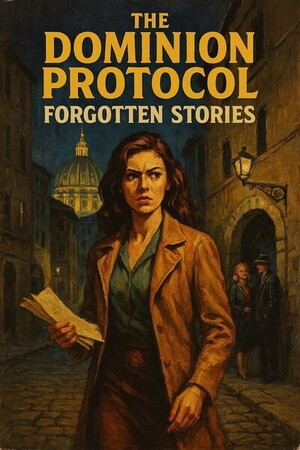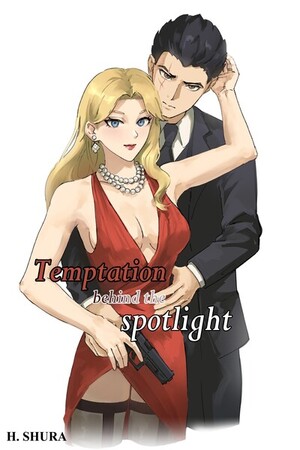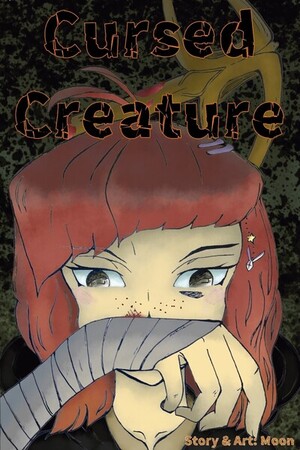Chapter 17:
An Invitation to Remember
Dominion Protocol Volume 12: Forgotten Stories
Jessica had spent years unraveling secrets. She had followed trails that led nowhere, pulled threads only to find them lead back to herself. But this—this was different. She stared at the scanned document on Olivia’s laptop, fingers hovering over the keyboard. The year. 1784. A year that wasn’t supposed to exist in her records.
She exhaled slowly.
Olivia was watching her carefully. “This isn’t the first time you’ve found your name.”
Jessica nodded. “No.”
“But?”
Jessica swallowed. “But this year wasn’t in any of the previous records. It is not in any of my memories.”
That meant one of two things. Either this was a mistake, or her knowledge of the cycle was incomplete. That was the part that bothered her the most.
Jessica tapped her fingers against the wooden café table.
“The Vatican keeps original copies of all major historical ledgers,” Olivia said, scrolling through her phone. “Even the ones they don’t want people to see.”
Jessica smirked faintly. “Especially those.”
Olivia nodded. “But getting access…”
Jessica knew where this was going.
“We can’t break in,” Olivia continued. “Not again.”
Jessica leaned back. “We don’t have to.”
Olivia arched her brow. Jessica folded her arms. “We find someone who already has access.”
* * *
It took them hours to find a name. By the time they did, the sun had dipped low, casting long shadows across the city, gilding the edges of buildings like fading memory.
Olivia tapped her screen, fingers dancing in practiced rhythm. The image of an older man in his early sixties appeared. He had sharp eyes hidden behind thin glasses. His collar was crisp beneath a worn black coat.
“Father Luca Montesi,” she said.
Jessica leaned in, sipping the last of her lukewarm coffee, her eyes scanning the digital dossier. “Jesuit historian. Archivist. Former lecturer in Florence. Two books on suppressed medieval doctrines. And…” she arched a brow, “...an expert in restricted materials.”
Olivia nodded. “He’s got deep clearance. And a deeper reputation.”
Jessica smirked. “You think he’s the kind of guy who likes bending rules?”
Olivia hesitated, then angled the screen toward her.
“He once gave a keynote at the Vatican Library. Not public, but it leaked. The transcripts circulated online before the Church could scrub them. He talked about how ‘access to history is a moral right, not an ecclesiastical privilege.’” She tilted her head. “He got reprimanded. Twice.”
Jessica raised an eyebrow. “And they still let him near classified documents?”
“He’s too valuable,” Olivia said. “Knows too much. Plus, he’s a Jesuit. They’ve always been the wild cards. He walks the line, but… I don’t think he believes in all the fences.”
Jessica sat back, thoughtful. “You think he’ll help us because he believes truth matters more than obedience.”
Olivia’s voice softened. “I think he remembers what it’s like to question everything. And I think he’s tired of pretending he doesn’t.”
The silence hung for a beat. Outside the café window, the last light bled from the sky, and the streets of Rome began to whisper with the life that only comes out at night.
Jessica stood, grabbing her coat. “Then let’s go knock on his conscience.”
* * *
Jessica maintained a neutral expression, though her pulse beat rapidly beneath her calm veneer. In the dim light of the restricted archive room, Father Luca Montesi regarded her with eyes that held centuries of secret histories. He shook his head slowly, as though in quiet lament, then began in a voice barely above a whisper:
“This was one of the records ordered destroyed in the 19th century,” he said, his tone laced with regret and warning. “It was never meant to be seen again.”
Jessica’s eyes flickered over his face, reading between the measured lines. “And yet you knew it existed.”
Montesi hesitated, the silence stretching as if time itself were holding its breath. Finally, he nodded ever so slightly.
“Then tell me why,” Jessica pressed, her voice steadier than she felt.
For a long, suspended moment, the only sound was the soft rustle of paper and the distant echo of footsteps in corridors long abandoned by time. At last, Montesi spoke again, his tone low and laden with the weight of forbidden knowledge:
“There were certain… figures,” he murmured. “Names that appeared throughout history in places they should never have been. The Jesuits, in their meticulous records, began to notice a pattern, a cycle, almost mythic in its persistence.”
He wasn’t telling her anything she didn’t already know, but he didn’t know that. Nonetheless, she felt her stomach tighten as the gravity of his words pressed in. Montesi’s gaze sharpened as he continued, each word measured like a line from an ancient script:
“Names repeating. Appearances that defied explanation. A cycle that, until now, no one could account for.”
He paused, and in that pause, the air seemed to vibrate with unspoken truths. Then, softly, almost imperceptibly, he added:
“This was one of the first times your name appeared.”
She didn’t flinch at the sight of the name. She’d seen it before, in too many places, under too many hands. What unsettled her was the way Montesi was watching her now. He was not searching for recognition, but for resolve. Pasolini had chosen to keep looking. And it had killed him. Montesi was asking, without asking, if she intended to do the same.
Jessica’s breath caught, and her fingers curled unconsciously around the edge of the table. For a moment, she stared at him, searching his eyes as if they could reveal the secret of her own existence.
Then Montesi’s tone shifted, more challenging now, as though he were testing her. “Who are you?” he asked, the question hanging in the charged silence.
Jessica didn’t answer immediately. He wasn’t asking about identity. He was asking if she’d made her choice to keep the memories or bury them again. She swallowed hard. On the surface, the question was not new, but coming from him it bore a weight she had long tried to ignore. She wasn’t sure she had an answer. She had spent her life unraveling layers, yet now the simplest question cut deeper than any mystery: Who, indeed, was she?
In that moment, as the dim light of the archive flickered over ancient documents and forgotten secrets, Jessica felt the collision of all her truths and lies. The room, the records, and Montesi’s steady, knowing gaze converged into one undeniable reality. She was part of a cycle, an echo of something far older than her own battered history.
Montesi’s eyes softened just a fraction, as if reluctant to shatter her fragile resolve entirely. “You have come seeking the truth,” he murmured. “But be warned, truth is not a gift; it is a burden. And I have been waiting for you, Jessica, for as long as these records have breathed.”
The words, though measured and calm, left Jessica with a chill that surpassed the cold stone beneath her hand. She realized that Montesi had not only expected their arrival, he had been watching, waiting, and even testing her, as if to ensure that she was ready to bear the secrets of a cycle that might never be broken.
In that charged silence, Jessica’s inner turmoil roiled as uncertainty mingled with an unyielding need to know. Though she had been told her truth many times in whispered recollections and halting confessions, hearing it spoken so directly forced her to confront what she had long denied: she was not just a solitary soul fighting shadows. She was part of something vast, something ancient.
And as the keeper of forgotten words, Father Montesi, looked at her with eyes that had seen both the rise and the fall of countless secrets, Jessica realized that the question “Who are you?” was not meant as an accusation, but as an invitation, a call to choose, once and for all, whether to embrace or defy the cycle that had haunted her existence.
* * *
They stepped out into the Roman dusk, where the air carried the scent of old stone and distant rain. The archive doors creaked closed behind them, sealing the silence inside like a confession whispered too late.
Jessica paused at the edge of the steps, one hand still gripping the iron railing. The city moved around them, slow, golden, indifferent. Vespas hummed in the distance. A streetlamp flickered to life overhead.
The wind picked up, brushing her hair across her face.
Olivia stood beside her, arms folded tight, jacket pulled closer to her body.
“You okay?” she asked.
Jessica didn’t answer at first.
She was staring across the piazza, but her eyes weren’t focused on anything visible. They were turned inward, back into parchment, into records not meant to exist, into the worn corners of memory that didn’t belong to her but lived within her all the same.
Her voice was quiet when it came.
“Pasolini knew.”
Olivia turned to look at her. “Knew what?”
Jessica exhaled, long and unsteady. Her fingers closed tighter around the strap of her bag, as if it might keep her from falling into the gravity of her own thoughts.
“That I wasn’t the first.”
The words tasted like rust.
She closed her eyes for a moment, letting the weight of them settle across her shoulders. It was more than a revelation. It was recognition. A thread that ran through time, through names and deaths and half-erased records.
Pasolini hadn’t died for politics. He had died because he had started to see what she now saw. Something buried deeper than corruption, older than conspiracy. He saw the pattern, the recurrence, and the presence. Now she stood where he once had, asking the same questions, staring into the same abyss, unknowingly stepping along the same narrow path. One that ended in blood.
Jessica’s voice was barely above a whisper. “He saw it. Just like I’m starting to.”
Olivia’s expression had shifted, less concern now, more focus. The kind she used when she felt the edges of something real, something dangerous.
Jessica turned to her, eyes unreadable.
“And I think he died because of it.”
For a long moment, neither of them spoke. The streetlight buzzed faintly. Footsteps passed behind them. Somewhere in the distance, a church bell chimed.
Jessica looked up at the sky—burnt orange bleeding into the deep blue of evening. The kind of twilight that made everything feel suspended, caught between one truth and the next.
“I don’t know how far this goes,” she said.
Olivia tilted her head. “But you’re still going to follow it.”
Jessica’s eyes narrowed.
“I’m already too far in.”
Somewhere, just past the horizon of certainty, she could feel it waiting. Whatever Pasolini had seen. Whatever truth had been too dangerous to name. It hadn’t died with him. It had only changed its face.




Please sign in to leave a comment.